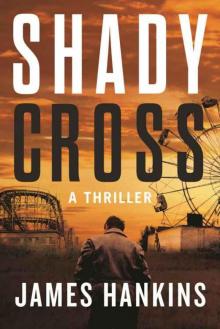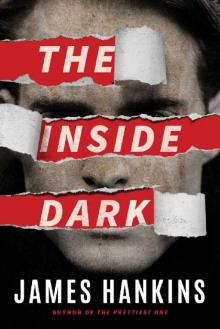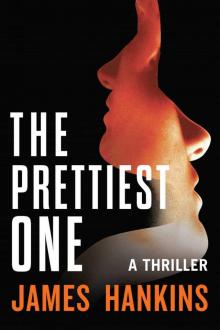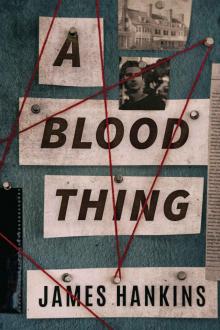- Home
- James Hankins
A Blood Thing
A Blood Thing Read online
PRAISE FOR JAMES HANKINS
“This dark, edgy tale touches a multitude of human emotions and is filled with sacrifice, loss, and terror. Hang on tight and remember to breathe.”
—Steve Berry, New York Times bestselling author on A Blood Thing
“Wonderfully fast-paced and suspenseful! Hooked me from the first page. I’d recommend to anyone who likes nice, twisty suspense novels.”
—Jennifer Jaynes, USA Today bestselling author of Never Smile at Strangers, on The Inside Dark
“This outstanding crime thriller from Hankins grabs the reader by the scruff of the neck and never lets go.”
—Publishers Weekly (starred review) on Shady Cross
“[A] fine, offbeat novel . . . crammed with crackling dialogue and characters who are . . . true to life.”
—Booklist on Shady Cross
“A thrill ride that takes you on a journey that is not for the ‘faint of heart.’ Wonderful character development, believable storyline, a true page turner, with an ending that I was not expecting . . . five stars!”
—Poised Pen Productions/Authors on the Air on The Prettiest One
“A prosecutor and a homeless man team up against a murderous conspiracy in this rollicking thriller . . . The two settle into an entertaining dynamic as . . . Hankins surrounds them with a crackerjack cast of bristling thugs, weaselly lowlifes, and beady-eyed feds, and he ties the story together with pitch-perfect dialogue, mordant humor, and action scenes poised exquisitely between menace and chaos . . . A complex, entertaining thriller.”
—Kirkus Reviews (starred review) on Brothers and Bones
OTHER TITLES BY JAMES HANKINS
The Inside Dark
The Prettiest One
Shady Cross
Brothers and Bones
Drawn
Jack of Spades
This is a work of fiction. Names, characters, organizations, places, events, and incidents are either products of the author’s imagination or are used fictitiously. Any resemblance to actual persons, living or dead, or actual events is purely coincidental.
Text copyright © 2018 by James Hankins
All rights reserved.
No part of this book may be reproduced, or stored in a retrieval system, or transmitted in any form or by any means, electronic, mechanical, photocopying, recording, or otherwise, without express written permission of the publisher.
Published by Thomas & Mercer, Seattle
www.apub.com
Amazon, the Amazon logo, and Thomas & Mercer are trademarks of Amazon.com, Inc., or its affiliates.
ISBN-13: 9781503950160 (hardcover)
ISBN-10: 1503950166 (hardcover)
ISBN-13: 9781503900363 (paperback)
ISBN-10: 1503900363 (paperback)
Cover design by Rex Bonomelli
First edition
For my entire family
CONTENTS
CHAPTER ONE
CHAPTER TWO
CHAPTER THREE
CHAPTER FOUR
CHAPTER FIVE
CHAPTER SIX
CHAPTER SEVEN
CHAPTER EIGHT
CHAPTER NINE
CHAPTER TEN
CHAPTER ELEVEN
CHAPTER TWELVE
CHAPTER THIRTEEN
CHAPTER FOURTEEN
CHAPTER FIFTEEN
CHAPTER SIXTEEN
CHAPTER SEVENTEEN
CHAPTER EIGHTEEN
CHAPTER NINETEEN
CHAPTER TWENTY
CHAPTER TWENTY-ONE
CHAPTER TWENTY-TWO
CHAPTER TWENTY-THREE
CHAPTER TWENTY-FOUR
CHAPTER TWENTY-FIVE
CHAPTER TWENTY-SIX
CHAPTER TWENTY-SEVEN
CHAPTER TWENTY-EIGHT
CHAPTER TWENTY-NINE
CHAPTER THIRTY
CHAPTER THIRTY-ONE
CHAPTER THIRTY-TWO
CHAPTER THIRTY-THREE
CHAPTER THIRTY-FOUR
CHAPTER THIRTY-FIVE
CHAPTER THIRTY-SIX
CHAPTER THIRTY-SEVEN
CHAPTER THIRTY-EIGHT
CHAPTER THIRTY-NINE
CHAPTER FORTY
CHAPTER FORTY-ONE
CHAPTER FORTY-TWO
CHAPTER FORTY-THREE
CHAPTER FORTY-FOUR
CHAPTER FORTY-FIVE
CHAPTER FORTY-SIX
CHAPTER FORTY-SEVEN
CHAPTER FORTY-EIGHT
CHAPTER FORTY-NINE
CHAPTER FIFTY
CHAPTER FIFTY-ONE
CHAPTER FIFTY-TWO
CHAPTER FIFTY-THREE
CHAPTER FIFTY-FOUR
CHAPTER FIFTY-FIVE
CHAPTER FIFTY-SIX
CHAPTER FIFTY-SEVEN
CHAPTER FIFTY-EIGHT
CHAPTER FIFTY-NINE
CHAPTER SIXTY
CHAPTER SIXTY-ONE
CHAPTER SIXTY-TWO
AUTHOR’S NOTE
ACKNOWLEDGMENTS
ABOUT THE AUTHOR
CHAPTER ONE
If Sally Graham had stopped at four beers tonight, maybe even five, she might have noticed that the front door of her apartment wasn’t locked when she got home, though she always locked it when she left. But she had downed six St. Paulis at the bar and a Heineken in Teddy Mulcahy’s truck on the way home, holding the beer in her right hand while giving Teddy a hand job with her left—and by the way, she was getting a little tired of people thinking she was a prostitute just because she engaged in a minor sex act now and then in exchange for a little cash or maybe even just a favor—so when she entered her little apartment above Dave Ellison’s detached garage, she wasn’t thinking about whether the lock had clicked when she turned the key. The only question in her mind was whether she would sleep better if she forced herself to throw up before rolling into bed.
She passed through the living room and barely noticed the shadow in the corner, the one that didn’t belong.
In the bedroom, she stripped down to her bra and underwear, almost toppling to the floor when one foot caught on the waistband of her jeans.
She decided not to vomit—at least intentionally—and walked back down the short hall to the kitchen, which was really nothing more than a kitchenette. She popped a couple of aspirin into her mouth, filled a glass with water from the tap, and was in midsip, her head tipped back, when something in the living room caught her eye. A tiny red dot of light. Then it was gone.
It was back a moment later, then gone again.
A blinking red light in the dark corner of the living room? Her drunken mind stumbled through the possibilities: Her TV? The cable box? No, those were in a different corner of the room.
She wished she’d turned on the living room light when she’d come home. The switch was right there by the front door.
She set the glass on the counter and took an unsteady step toward the blinking light. Another step, and she realized that the light belonged to a video camera mounted on a tripod. She’d never seen that camera before. And she wasn’t too drunk to know that the blinking red light meant it was recording.
Her first thought was that her landlord had snuck in and set up the camera, hoping to capture footage of Sally he could whack off to later. But why would Dave put the camera in the living room? Why not her bedroom? Or even the bathroom, if he was especially perverted? And why wouldn’t he hide it rather than leave it visible in the corner of the room?
As she stood wondering these things, the shadows behind the camera shifted, and one detached itself from the darkness around it. A man stepped into the dim light spilling from the kitchen. If he had looked any less strange, Sally would have screamed immediately. Instead, she blinked stupidly as her beer-soaked mind tried to comprehend what she was seeing
.
He wore regular clothes, the same clothes every guy she knew wore: long-sleeved T-shirt and blue jeans. But he had no eyes. Just . . . blackness where his eyes were supposed to be, a white oval where his face should have been. Goggles, she realized, that’s what they were, goggles over a white mask that covered his entire head. But it wasn’t just a mask, because it had no bottom; it plunged straight down into the collar of his shirt. She saw now that he wore white gloves . . . but she saw no skin at the man’s wrists, only white fabric, which made her realize that the gloves were attached to white sleeves that ran under the long sleeves of his T-shirt.
What the hell? Underneath a set of regular clothes, the intruder seemed to be wearing a white suit that covered him from head to toe.
And he was striding toward her.
She realized, too late, that the time to scream had come and gone. She gave it a try anyway, but the man reached her too quickly and clamped a white-gloved hand over her mouth. She tried to back away, but he slipped behind her, his hand tight over her lips. He reached his other arm around and punched her in the chest, on the left side just below her shoulder, and the blow hurt more than she would have thought possible. He’d whispered something as he struck her, two words, hard to understand through his mask, but it sounded like he’d said, “One eye.” She wanted to ask him what that meant—it seemed important that she know—but she suddenly couldn’t find the breath to speak.
Her head fell forward, and she saw a bloody knife plunge into the other side of her chest, just below her right shoulder, the weapon clenched in her attacker’s fist. She was wrong. He hadn’t punched her a moment ago; he’d stabbed her. He was killing her. He whispered again, and this time she heard it clearly, though she didn’t understand it. “Two eyes,” he said.
Her legs grew rubbery and weak, but the man held her tightly, preventing her from crumpling to the floor. Her eyes fell on the video camera recording her final moments.
She always used to tell people that her life wasn’t much—in fact, it kind of sucked—but it was the only life she had. She realized now how true that was.
The man reached across her body from behind and sank the knife into the left side of her stomach.
“Smile for the camera,” he whispered.
It was the last thing she heard in this world.
The man looked at Sally Graham’s body on the floor again, as he had done a few dozen times since killing her. Then he looked back down at a page in his black three-ring binder, taking a long moment to study the highly detailed pencil sketch he had made of the murder scene.
He was largely satisfied. The position of the body seemed mostly right, lying on its back, one arm down by its side, the other flung out as if the woman had been reaching for something as she died. The bare legs looked close to correct, too, with her left straight and her right bent slightly at the knee. He knelt down and straightened the right leg just a touch. And there were two stab wounds on the body, in just the right places, and that big curving slice across her stomach—just like in his sketch. As planned, the underwear she’d been wearing was in his pocket; he would dispose of it later. The soiled panties he’d brought with him were lying on her ravaged stomach where he’d dropped them, soaking up blood. He picked them back up and slipped them into a Ziploc bag, then stood and stepped back to survey the scene yet again. A quick glance at the sketch told him that her hair was just a little wrong. He stepped close to the body again, leaned down, and brushed a few strands away from her cheek. He nodded. That looked right.
He frowned, though, at the blood that had pooled under and around her torso. The puddle was a different shape than in his sketch. That shouldn’t have bothered him. He’d done the best he could. After all, he’d made the drawing weeks before he’d killed her and had managed to get most of the elements of the scene nearly perfect. Perhaps he should be satisfied with how closely the grisly scene before him resembled his preplanned tableau. But after all the hours he’d put into this, after all the effort and planning, he had expected perfection. He deserved for things—for everything—to be exactly as he envisioned them. But he couldn’t control the way the blood flowed through the carpet’s fibers, he realized. He would try to forget about it. It was a small thing, after all, one tiny piece in a vast puzzle he was assembling. One tiny brushstroke in a grand masterpiece. In fact, he could revise the sketch when he got home. Then everything would be perfect after all.
Not surprisingly, the clothes he wore over his bodysuit were covered in blood. He walked over to the camera, leaving bloody sneaker prints on the carpet along the way, and stopped the recording. His feet were sore. The sneakers he was wearing were at least a size too small for him. He slipped a pair of latex gloves over the white gloves attached to his bodysuit, then put the camera, tripod, and binder into a duffel bag. Before zipping the bag closed, he added two Ziploc bags—the bloody underwear in one, the bloody knife in the other.
Then he left, slipping out into the night, without another look at Sally Graham’s dead body.
CHAPTER TWO
Vermont Governor Andrew Kane smiled when appropriate, turned serious when warranted, and did a credible job not appearing irritated about the impromptu press conference that had sprouted from what was supposed to be a casual, feel-good event on a sunny Friday morning: the ceremonial ribbon cutting commemorating the opening of the new senior center in Randolph. He stood holding a pair of gold-plated, oversize scissors and, as patiently as he could, answered questions from the reporters who had gathered with other citizens to share in the moment. Invariably, though, questions drifted from the new senior center into more political waters, as Andrew expected they would—with reporters questioning his budget plan; his chosen successor to the retiring state tax commissioner; and, despite strong opposition, his unwavering support of the plan to build new and better low-income housing to replace the soon-to-be razed projects in the city of Rutland.
“I realize that there are people who would prefer a new shopping mall on that land,” Andrew said, “or a sports complex, or luxury apartments, but I doubt you’ll hear that opinion from the former residents of the projects, folks who moved out because their living conditions had become unbearable, who left one by one while the apartments around them turned into flophouses, or drug dens, or temporary brothels. I bet those people would love to say goodbye to the shelters they’re staying in or the park benches they’re sleeping on. I bet they’d love to hear that we’re putting up newer, safer housing they could afford instead of another shopping mall.”
The small crowd grumbled a little before the questions started again. As usual, despite the fact that Andrew was more than halfway into his second two-year term, a reporter managed to slip into his question the fact that he was the youngest person to be elected governor in Vermont’s history—he was thirty-one when he assumed office—implying that his age was some sort of handicap. It probably wouldn’t be long, he knew, before one of them hinted—as someone did from time to time—that he likely wouldn’t have been elected if his surname wasn’t Kane, as if his fitness for office were based entirely on having had both a father and a grandfather who were respected senators, a great-grandfather who was a distinguished federal judge, and a great-great-grandfather who’d had the Midas touch a hundred or so years ago when it came to investing. Nicholas Kane made so much money in his day that none of the Kanes to follow had been able to do much to lighten the family’s coffers. They weren’t close to being Rockefellers or Vanderbilts, but when it came to the net-worth ladder, far more folks in Vermont were looking up at them than down.
Andrew decided the questioning had gone on long enough. He had a busy day ahead of him, as always. And he was behind schedule, as always.
He raised his hands. “Okay, everyone, I’ve rambled on long enough,” he said, as though having to answer a few dozen questions he hadn’t been prepared for had been his idea. “Let’s remember why we’re here. This gorgeous new senior center. Isn’t it something? I almost wish I were
a senior myself so I could take advantage of everything this place has to offer . . . though that day is still a ways off, which I’m often reminded of.” As he said that, he glanced pointedly at the reporter who had referenced Andrew’s age a few moments ago, which drew a few laughs.
He turned and handed the big scissors to Jim Garbose, his press secretary, who was standing off to the side, and said quietly, “Remember when they used to love me, Jim?”
“They still love you. They just really want a new shopping mall.”
“And for poor people not to get in the way of that.”
“Exactly. Now smile and shake hands. You’ve got a meeting in forty minutes with the secretary of transportation back at the Pavilion,” Garbose said, referring to the five-story building that housed the governor’s offices, along with a press briefing room, a reception room, and even a small apartment for the governor, which Andrew had rarely set foot in, using it only during a couple of snow emergencies and a two-day stretch when legislative sessions ran late into the night. A 1971 reconstruction of a nineteenth-century hotel of the same name, and on the same site, the Pavilion also housed the offices of Vermont’s attorney general and its state treasurer.
“Okay,” Andrew said. “I’ll try to keep it moving.”
He turned and saw the assemblage inching closer, the people jockeying politely for better positions. He smiled at the folks who, just moments ago, had been grousing. Now they were smiling back and reaching out toward him while maintaining a respectful distance—no doubt due in part to the imposing figure to Andrew’s right, Mike Burrows, the square-jawed state trooper acting as Andrew’s security detail today. Andrew shook their hands and thanked them for coming, looking into their eyes as he did, one after the other, until their faces blended together.
He was moving down the line, nearing the end of the small crowd, making his way toward his black GMC SUV, when he grasped a man’s hand thrust toward him and immediately felt something between their palms. The man withdrew his hand quickly, and Andrew was left holding an object. A small black cell phone.
Faint alarm bells clanged in his head, but he quickly relaxed. Plenty of people wanted to use their phones to have their photos taken with the governor. Usually, they held it themselves while taking a selfie beside Andrew. Or they would give their phones or cameras to their friends or family members. Now and then they even tried to hand them to Andrew’s security detail, which never went as they hoped. So, although this man had gone about it in odd fashion, most likely he simply wanted a picture he could post on his social media site of choice.

 Shady Cross
Shady Cross Jack of Spades
Jack of Spades The Inside Dark
The Inside Dark The Prettiest One: A Thriller
The Prettiest One: A Thriller A Blood Thing
A Blood Thing Drawn
Drawn